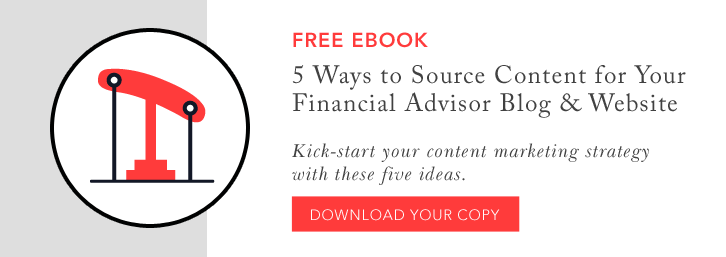Is Social Media for Financial Advisors Just a Social Commercial?
Anyone who is interested in marketing anything over the next decade should read this blog. If you care about getting sales, then you have to care about getting attention, because essentially, they’re the same thing. So, here’s where I see social media for financial advisors going – not where you would expect – and what you need to know if you want to be able to market your business effectively.
I see social media hitting a corner, and I’m pretty unique in my vision because no other marketers seem to be saying the same thing.
Other marketers will tout their services like it’s the movie “Field of Dreams”: “If you build it they will come.” I see it the opposite way. Social media isn’t like it was two years ago when you could post a blog and get 2,000 views, even if it was nothing special. Now it’s more like, “Don’t bother building it unless it’s the next Taj Mahal.”
Creating fresh, relevant content for your website or blog can be a challenge. Say goodbye to writer's block! Download our Free eBook: 5 Ways to Source Content for Your Financial Advisor Blog & Website
Nowadays, social media platforms are pushing down semi-popular or unpopular content in favor of the juicy postings. They’re using algorithms that track your history.
Here’s an example:
Let’s say that you post a blog on LinkedIn and it gets 100 views. LinkedIn remembers this, and the next time you post a blog, it serves it up to fewer people in the news feed. It’s a death spiral, where now your content has to perform even better than the last one just to get to where you were. So if you’re not getting views, you have to resort to paid advertising to make sure that your brand gets visibility.
All of this serves the platform’s goal of earning advertising revenue. Remember, they make no real money off the subscriber who joins and doesn’t post anything or participate by sharing or liking anyone else’s updates. The big margin is made from companies who want to place their content in front of potential buyers in the news feed, and they’ll pay in some cases as high as $7/click to get that (I’m referring to LinkedIn advertising; Facebook tends to be a bit less expensive).
By the way, I’m not ruling out sponsored direct advertising. It works great for some businesses and not so great for others, but it depends on who you are. But don’t depend on your marketing consultant to tell you that, because most of them belong to the eternally optimistic club that is determined to convince you that their solution is the one that works without fail and you should buy it now!
Before you interpret this as a recommendation for all of you to run out there and tell your marketing people that you want to launch Facebook ads, here’s what I’m trying to get at: Social media is increasingly less about being social and more about being a social commercial.
Here’s another example:
Right now, there is an option to pay for messaging or to do it for free. LinkedIn recently built in an instant messaging function to the platform, resembling Facebook’s. You can instantly communicate with anyone you are a first-degree connection with for free. Don’t expect this to last. Once they can afford to lose people, they’ll start charging you to send messages, almost the same as how you have to pay for storage space on Gmail. All good free things must come to an end, unfortunately.
All of this is the inevitable twist that the path of social media will take. It’s a loud, noisy social media world and it’s only growing every minute. Since I’m in the business of creating marketing strategies, I don’t rule social media out as a viable way to promote your business. I am airing a great big warning sign though and telling all of you that the things that have historically worked for you are not likely to work in the future. If you want to survive, you will have to evolve just like Darwin said years ago.
Here’s what I’d recommend:
- Unless it’s penetrating, insightful content that nobody else is offering up, spare yourself the trouble of creating it.
I’ve seen success and failure, and I can tell you this golden rule never fails.
- If you can’t find something original to say, hire a ghostwriter who is a subject-matter expert in your field.
It’s even better if the copywriter has actually worked in your field. Copywriters who are generalists are going nowhere. If you aren’t sure how to judge, ask them to show you a copy of the most recent blog they published on behalf of a client in your industry. It should display something that you yourself did not know or would not have thought to say. If it’s the same old “spiel,” then regardless of what they say, they are not an expert in your industry. I used to be a financial advisor and I can honestly say that I’m a killer when it comes to creating content in this vertical. Vegan makeup, not so much. Office furniture, not so much. In other words, every copywriter has strengths and weaknesses and you want to get the one who lines up with what you need. Do this or waste your money.
- Look for the gobblers.
Everybody says a bigger following is better. I wouldn’t argue with that, except it doesn’t help unless the following wants to gobble you up. I’d take a small, engaged following that likes, shares, responds, and wants to hear about what I say over a large following any time. For example, I have about 3,000 followers on my YouTube channel. Not the biggest base in the world but I get a myriad of comments every time I post a video because I talk about solutions to problems that these people have, and they voraciously gobble this stuff up. When I don’t post for a few weeks, they message me and ask me where I am. That is how far this has gone. It has led to quite a few engagements for my business because every so often, I slip in a comment about how I work with people and help them through a special program I offer. I don’t say it a lot but the point gets across and people email me wanting to buy.
- Avoid blatant promotions.
Well, almost blatant promotions. It gets people’s guards up. See my comment above about how I slip in comments to my videos. Some advertisers have such a knack for it that you don’t mind being sold to, but for the most part, and among certain populations, people will turn a deaf ear to nearly anything that doesn’t speak to why they logged on. They aren’t there to be sold anything. They are there to be entertained or intrigued.
As for specific marketing tactics (online lead generation, blogging vs. pay-per-click vs. newsletter vs. YouTube), I’d have to know what you are trying to achieve before I tell you if it’s worth it. If you’re curious to hear what I think, then go ahead and send me an email.


